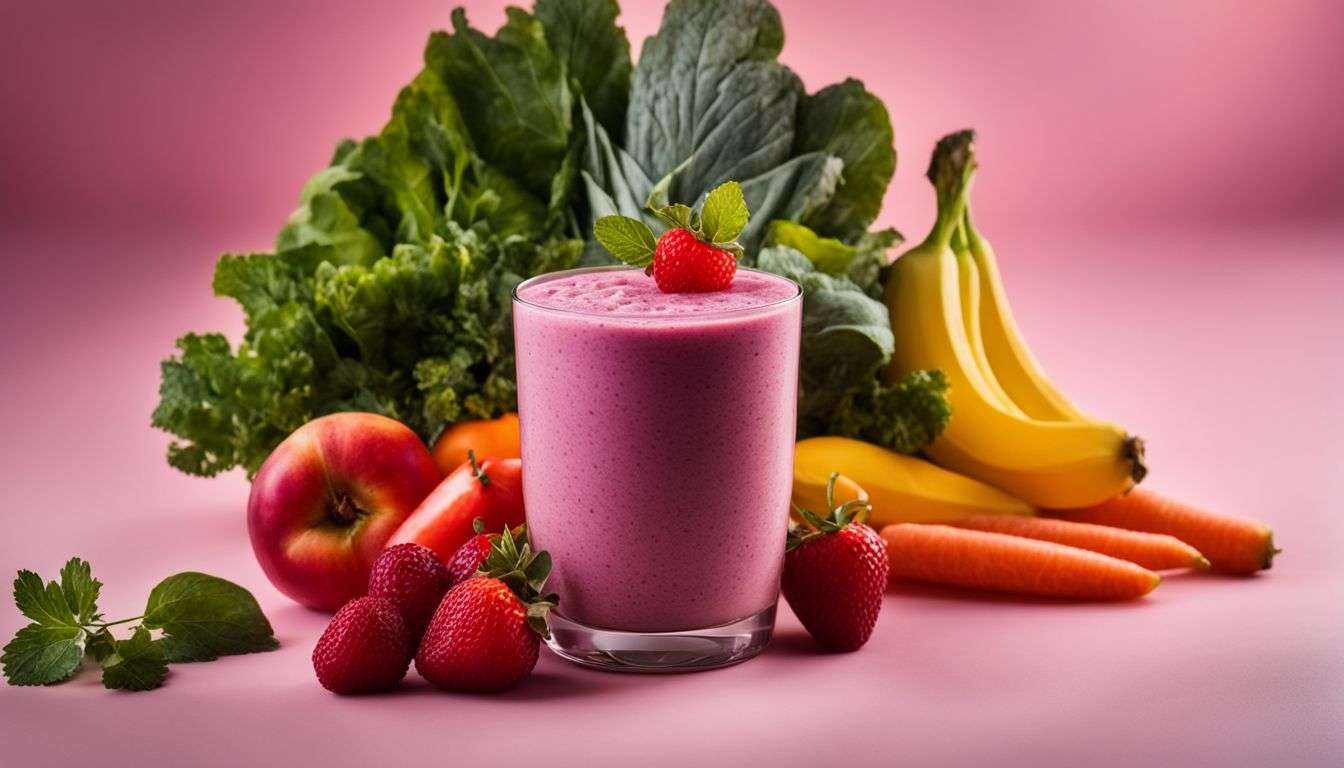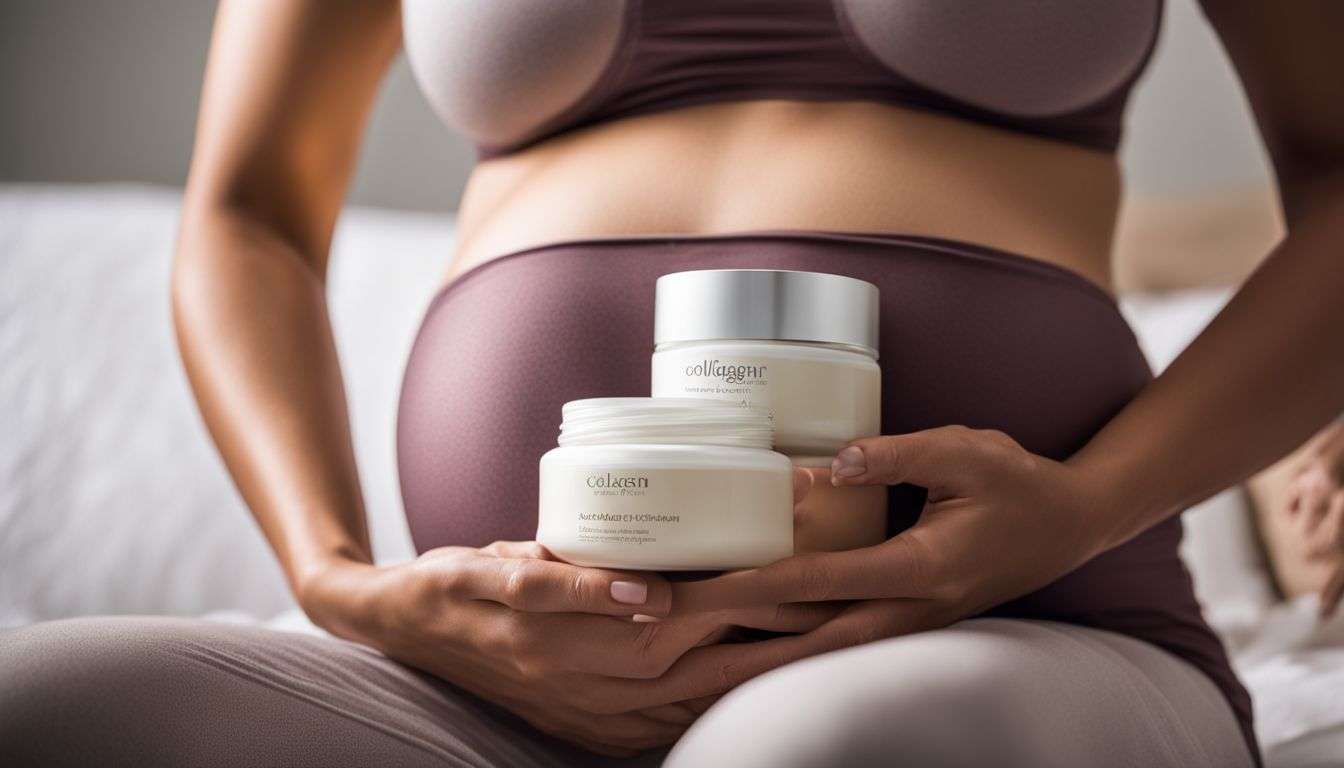Heard the buzz about collagen during pregnancy and wondering what’s fact and what’s fiction? You’re not alone! Collagen, that magical protein keeping our skin supple and joints happy, plays some pretty neat roles when you’re expecting a little one.
Today, we’ll sift through the myths and lay down the facts to clear up any confusion—because let’s face it, pregnancy already comes with enough surprises. Get ready for an eye-opener; this is going to be interesting!
Key Takeaways
- Collagen is a protein that helps skin stretch and keeps joints strong during pregnancy.
- Taking collagen supplements is safe when you’re pregnant or trying to have a baby, but always talk to your doctor first.
- Vegan collagen supplements can also be good for pregnant women who don’t eat meat or animal products.
- Some conditions in pregnancy, like preeclampsia and diabetes, can mess with how collagen works in the body.
- There are many types of collagen supplements out there. They sometimes come with added vitamins and can help with things like skin elasticity and joint health.
Understanding Collagen

Alright, let’s dive into the world of collagen – that superstar protein that’s literally holding us together! From your glowing skin to those tough-as-nails tendons, collagen is the unsung hero playing a vital part in our bodies.
and yep, it’s especially intriguing when you’ve got a bun in the oven. So buckle up as we unravel this mystery protein – no boring science class vibes here, I promise!
The Collagen Superfamily
Collagen is like a big family with lots of different members. Each type has its own job in our bodies, just like cousins who do different things at a family gathering. We have more than 28 types of collagen! Think about it; that’s even more than the number of letters we have in the alphabet.
In our body, collagen acts like glue holding everything together. It makes our skin stretchy and helps wounds heal quickly. It also keeps bones strong—like how steel frames support buildings—and lets us move smoothly by hooking up muscles to bones.
Plus, this amazing stuff changes during pregnancy to help both moms and babies stay healthy.
The Role of Collagen in the Body
So, now we’ve got the big collagen family all sorted out. Let’s dive into what it actually does for us. It’s like a super-strong glue that holds everything in your body together. Your skin, bones, muscles — you name it! Without collagen, our bodies would be like a floppy jellyfish.
This wonderful stuff is also chatting with cells to help them stick to where they need to go and keep things tight and right. It’s important everywhere — from the tip of your nose down to your toes.
Collagen keeps organs in shape and makes sure wounds heal up nicely and neatly. Plus, it helps moms-to-be by providing extra support as their bellies grow and making sure the little one inside has somewhere strong to hang out until delivery day arrives!
Collagen During Pregnancy

As the little life inside you begins its miraculous journey, your body turns into an architectural wonderland – and collagen, oh sweet collagen – it’s like the scaffolding that holds this beautiful construct together.
But hold up, momma-to-be; let’s dive into how this protein powerhouse plays its part during your nine-month stretch.
The Expression of Collagen at the Maternal Fetal Interface
Collagen plays a big role when you’re pregnant. It’s like a superhero for cells, sticking them together at the place where mom and baby meet—the maternal-fetal interface. Here, different types of collagen made by cells called decidual stromal cells (DSCs) and trophoblasts come into action.
They help cells to stick, grow, and move in the right places.
This is not just about making things stick; it’s also about peacekeeping among immune cells. Collagen at this special meeting spot can make sure everyone gets along by helping form an immune tolerance zone.
Think of it as the body throwing a welcome party for the new baby inside! But sometimes this system doesn’t work right, like in unexplained miscarriages or when moms have diabetes during pregnancy.
That’s when knowing about collagen becomes super important to keep both mom and little one healthy.
Collagen Expression in the Trophoblasts
Trophoblasts are key players in pregnancy. They make up part of the placenta and attach to the mother’s uterus. In these trophoblasts, collagen is super important. It helps them dig deep into the uterine wall which lets a healthy baby grow.
But sometimes, things can go wrong with collagen in these cells. This may lead to sad outcomes like miscarriages or preeclampsia, which is when a mom gets really high blood pressure during pregnancy.
Doctors have found that strange collagen expression might be one reason for these problems. Keeping an eye on how collagen behaves in trophoblasts could help keep both mom and baby safer during pregnancy.
Collagen Expression in the Decidua
So, the decidua and collagen are pretty tight! The decidua is part of the uterus that gets all cozy and thick during pregnancy. Now, here’s a fun fact: when things go wrong with how much collagen hangs out there, it can lead to some real sadness, like miscarriages.
It’s not just about quantity either; even if the amount is right but it shows up at the wrong time or in a weird way, troubles might follow.
Okay, let’s get this straight – hormones from being pregnant might be calling the shots on how much collagen sets up shop in the decidua. It’s tricky because you want enough for a strong home for the baby but not too much where it becomes a fortress! Nature knows what it’s doing most of the time, though, keeping everything balanced for both mommy and baby.
The Role of Collagen in Normal Pregnancy
When it comes to the miracle of life, collagen is like the unsung hero working its magic behind the scenes during pregnancy. It’s kind of like having a construction team in your body, ensuring everything stretches, holds, and adapts just right for that little bun in the oven.
Trophoblast Invasion
Trophoblast invasion is like a dance that takes place deep in the mom’s womb. It’s got to be just right for the baby to stick and grow. Too little and there’s trouble, too much, and it’s not good either.
These trophoblasts – they’re kind of like the roots of a tree – dig into the mom’s tissue so nutrients can pass from her to baby.
Here’s something pretty amazing: when oxygen is low in those early months, these cells step up their game at the maternal fetal interface. They get better at invading because that’s what helps them survive this tough time! But remember, it has to be balanced.
If things go haywire with collagen here, it could lead to sadness instead of joy, like miscarriages or other problems nobody wants.
Immune Tolerance
Your body is like a secure house during pregnancy, and the immune system guards it. Now, collagen steps in as a peacekeeper, making sure those guards don’t overreact to the new life growing inside you.
It helps teach the immune cells at the place where mom’s body meets baby’s (the maternal-fetal interface) how to be tolerant and chill out. This means cells like T cells and macrophages hang out without causing trouble.
Not just that, but collagen also guides decidual natural killer cells—think of them as special agents trained for pregnancy—to behave nicely around the fetus. Instead of attacking, these cells support a healthy start for your little one by creating an environment that says “welcome” instead of “keep out.” So yeah, this amazing protein not only keeps skin stretchy and joints strong but also makes sure everyone gets along inside so baby can grow safe and sound.
Angiogenesis
Keeping a healthy balance, collagen also steps up in forming new blood vessels, a process known as angiogenesis. This is super important for the growing baby inside you. It helps bring more blood to the placenta and supports your little one’s development.
Collagen has this cool job of making sure new blood pathways are made right where they’re needed.
Now, it doesn’t always go perfectly. Sometimes when there isn’t enough or too much collagen, it can mess with how these new blood vessels form. That can lead to problems during pregnancy that nobody wants.
But generally, collagen is doing its thing at the maternal fetal interface—it teams up with special receptors to oversee angiogenesis like a boss!
Cervical Remodeling
So, after blood vessels form and adapt in the angiogenesis stage, there’s another key change that needs to happen. It’s called cervical remodeling. This is pretty important for a baby to be born at the right time.
Collagen types I and III are big players in making the cervix strong. Think of collagen like a tough little rope that holds everything tight.
As the due date gets closer, something cool happens – the cervix starts getting softer. But here’s the twist: even though it feels different, there’s actually just as much collagen in there as before! It’s not disappearing; it’s changing how it acts so that when it’s go-time for baby to arrive, everything can stretch without any issues.
And guess what? Progesterone – yep, that hormone that everyone talks about during pregnancy – might help keep preterm births from happening by keeping this remodeling on schedule.
By taking care of those collagen ropes in your cervix with progesterone treatment, they’re less likely to get too loose too soon! Now isn’t that a bit like having an extra helping hand?.
The Role of Collagen in Pathological Pregnancy
When pregnancy takes a left turn into complication city (yeah, that’s not on anyone’s travel bucket list), collagen plays quite the double agent role. From contributing to troubles like preeclampsia to haunting us with premature membrane poppage (a real party pooper!), this protein can be both hero and villain in the story of pathological pregnancies.
So, let’s dive deep and unravel how this sneaky character can shift from friend to foe when expectant moms hit a bumpier-than-expected journey.
Recurrent Miscarriage
Losing a baby more than once can break your heart. It’s tough, but know this: the stuff that holds our body together—collagen—might play a big part. Some science folks found that if collagen acts weird in the womb, it could lead to losing babies over and over.
It’s like if there’s a team inside you working on making a cozy home for the baby, and collagen is one of the main workers. But when it doesn’t show up right or at all, things go wrong.
Then there are these special cells called dNK cells—they’re kind of like security guards making sure everything stays calm at this baby-growing party—but guess what? If their gear (something scientists call LAIR-1) goes wonky or they wear too much (like having high levels of integrin ꞵ1), that might also cause trouble leading to multiple miscarriages.
So we’re learning that keeping an eye on these tiny details really matters—for you and your future little one!
Diabetes Mellitus with Pregnancy
Pregnancy can be a tricky time, and if you have diabetes, it’s like having an extra ball to juggle. This condition messes with how collagen in the body behaves. Imagine collagen as the glue that holds our cells together; now picture what happens when the glue isn’t working right – things start falling apart! For pregnant women with diabetes, their bodies might not make enough of certain types of collagen or they could make too much of others.
It’s particularly tough on trophoblasts and DSCs – those are cells super important for making a cozy home for a growing baby.
This mix-up can lead to some serious problems like miscarriages because the womb lining doesn’t thicken as it should, which is crucial for pregnancy to stick around. Basically, all this trouble with collagen could mean that mamas-to-be need extra care to make sure their bundles of joy stay safe and sound until they’re ready to meet the world.
Okay, let’s talk about preeclampsia next – another curveball thrown at expecting moms where again we see issues crop up with our friend collagen.
Preeclampsia
Moving on from diabetes, another condition that can happen during pregnancy is preeclampsia. This health problem causes high blood pressure and can make it hard for the baby to grow right inside the mom.
Doctors think it starts when the placenta doesn’t attach to the womb as well as it should. The placenta might not get enough blood, which is bad for the baby.
If a mom gets preeclampsia, she might have headaches, see spots in her vision or her hands and feet could swell up. It’s a serious thing because if not cared for, it can lead to bigger problems like seizures or preterm birth.
That’s why doctors keep an eye on blood pressure and check ultrasounds to see how big the baby is growing. They want both moms and babies safe and healthy!
Premature Rupture of Membranes
Okay, so let’s chat about what happens when the fetal membranes break too early—yep, we’re talking about premature rupture of membranes. It sounds a bit technical, but it’s basically when the sac around your baby pops before it’s time for labor to start.
This can be a real curveball because it might lead to your little one saying “hello” way sooner than expected.
Now collagen—it’s super important here because it helps hold those fetal membranes together like strong glue. But sometimes, things get out of whack and there isn’t enough collagen or it doesn’t work right.
That’s when you might hear terms like abnormal expressions of collagen and its fragments are linked with this early breaking of waters. Experts are working hard to figure all this out so they can help keep babies cozy until their proper arrival times!
Can You Take Collagen While Pregnant?
When it comes to collagen, the big question on every expectant mama’s mind is – can you add this protein powerhouse to your pregnancy diet and reap its benefits without worry? Dive right in as we unfold the truth, no fluff or medical jargon here—just the straight-up facts with a side of real talk.
Is it Safe to Take Collagen During Pregnancy?
Yes, taking collagen during pregnancy is safe. Many doctors say it’s okay because it can help both the mom and the baby. It boosts skin elasticity which could mean fewer stretch marks for mom as her tummy grows.
For joint pain, which is common when pregnant, collagen might offer some relief too.
Next up: let’s look at whether you can take collagen while trying to conceive!
Can You Take Collagen While Trying to Conceive?
So, while it’s clear that taking collagen during pregnancy is a topic worth exploring, what about when you’re ready to start a family? If you’re trying to conceive, adding collagen supplements to your diet can be a smart move.
They’re packed with amino acids which are like building blocks for the body and can help make sure everything is running smoothly.
Your body uses these amino acids from collagen to create more than just strong hair and nails; they also play a role in fertility. For instance, the amino acid glycine helps your body manage growth and repair.
This could support your reproductive system as it prepares for pregnancy. However, always talk with your doctor before starting any new supplement because they know all about you and what’s best for your health journey!
Benefits of Taking Collagen During Pregnancy
Diving into the benefits of collagen when you’re sporting that gorgeous pregnancy glow—trust me, it’s not just about keeping those pesky stretch marks at bay; there’s a whole lot more to this protein powerhouse.
(Read on and I’ll spill the beans!).
Strengthening of Joints and Ligaments
Oh boy, growing a tiny human sure does a number on your body! All that extra weight can be tough on your joints and ligaments. But hang in there – collagen’s got your back (and knees..
and hips). It’s like the magic ingredient for moms-to-be. Think of it as nature’s duct tape; it keeps everything stuck together just right.
Collagen type IV and V crowd around those stretchy parts, making them strong during all the baby-carrying months. So when you feel like your pelvis is doing gymnastics, collagen helps to hold things steady.
Plus, say goodbye to achy days! This stuff takes the ‘ow’ out of ‘how much longer?’. And hey, if you’re into keeping that skin snappy too – bonus! Collagen works wonders against those pesky stretch marks trying to sneak their way onto your belly party.
Keep up with that collagen intake and show off the power of pregnancy without letting anything go wobbly on you!
Boosts Elasticity in Your Skin
Your skin really needs to stretch during pregnancy, right? Collagen can be your best friend for that. It helps make your skin more elastic. That means it can grow with your baby bump and snap back later on.
Think of it like a rubber band—it’s got to stretch but also keep its shape.
If you’re worried about wrinkles or stretch marks, more collagen might help. Your body is doing so much work while you’re pregnant; it’s nice to give it some backup! And hey, who doesn’t want their skin feeling smooth and looking good?.
Next up – let’s talk about how collagen ramps up your protein intake..
Enhances Your Protein Intake
Now, let’s chew on this: collagen isn’t just about keeping your skin stretchy. It packs a serious protein punch too! Pregnant or not, your body craves protein. It’s like the building block for every cell in you and your baby.
Taking collagen peptides during pregnancy can help meet that need. Think of it as a stealthy way to sneak more protein into your daily eats, especially when meat doesn’t sit well or if other sources are hard to come by.
Collagen during these special months is like having a secret ally for your muscles and bones—it’s full of amino acids that are sometimes hard to get from food alone. These little guys work overtime, helping keep everything from muscles to blood vessels healthy.
Plus, since we’re talking about growing a human here, getting enough protein is big-time important for supporting all that fetal growth happening inside!
Understanding Vegan Collagen Supplements During Pregnancy
Vegan collagen supplements are a big deal for moms-to-be who don’t eat meat or animal products. These supplements come from plants and can help your body make its own collagen. Think of it like giving your body a little plant-powered boost!
Taking vegan collagen when you’re pregnant could be helpful since your body needs extra support during this time. Your skin is stretching, and you want to keep joints strong as your baby grows.
Plus, these supplements often have vitamin C and other good stuff that helps both mom and baby stay healthy.
Just make sure to chat with your doctor before starting any new supplement while you’re pregnant. It’s the smart move to ensure everything is safe for you and the little one on board!
Top Collagen Supplements for Pregnancy
So, you’ve learned about vegan collagen supplements, but what about the top picks for when you’re expecting? Here’s a list of popular choices for pregnant women looking to add collagen to their diet:
- Garden of Life mykind Organics Plant Collagen Builder – Made with plant-based ingredients, this supplement includes biotin and vitamin C, which are important for both mom and baby.
- Vital Proteins Collagen Peptides – Easily mixed into any drink, these peptides are sourced from grass-fed cows and contain no added sugars or sweeteners.
- NeoCell Super Collagen – This option has hydrolyzed collagen peptides that help your body absorb them better. Plus, it’s gluten-free!
- Ancient Nutrition Multi Collagen Protein Powder – It mixes different types of collagen from several sources and is designed to support a healthy pregnancy.
- Sports Research Collagen Peptides – For fitness-focused moms-to-be, this supplement is perfect. It supports joint health and is third-party certified for purity.
- Dr. Axe Multi Collagen Protein – Includes types I, II, III, V and X collagen from four food sources, working together for overall body support during pregnancy.
- Reserveage Nutrition Collagen Replenish Powder – With hyaluronic acid and vitamin C added in, this powder aims at enhancing skin elasticity which can be great as your belly grows.
Myths About Collagen During Pregnancy
Oh, and you won’t believe some of the tall tales out there about collagen when you’re expecting! Stay tuned as we bust those myths wide open—your jaw might just drop.
Risk of Taking Collagen During Pregnancy
So, you might worry about the risks of taking collagen when you’re expecting. Good news! There’s no scare in sharing that experts haven’t found danger zones for mamas sipping on bone broth or popping a collagen pill.
Sure, getting chummy with your doctor before starting any new supplement while pregnant is super smart. They’ll give you the green light based on what’s best for you and your little one.
Now, it’s true that everything we eat or drink cozies up to our baby in some way. But so far, collagen as a buddy hasn’t caused frowns or raised eyebrows among health pros. It’s like joining hands with folic acid and vitamin C—they’re all part of keeping both mama and baby in tip-top shape during those special nine months.
Just make sure to pick supplements without weird add-ins like heavy metals; keep it clean and simple, just how nature likes it!
The Myth of Marine Collagen During Pregnancy
Some people think marine collagen is a no-go for expectant moms. They worry it could harm the baby or the mom. But hey, let’s clear this up: there’s no solid proof that says marine collagen is bad during pregnancy.
Sure, you want to be safe and might choose plant-based options instead. That’s totally fine! Just remember to chat with your doctor before you start any new supplement. Each person’s different, and what works for one may not be right for another.
The key here? It’s all about finding what fits best for you and your little bundle of joy on board!
Are There Any Risks of Using Collagen Supplements During Pregnancy?
Using collagen supplements during pregnancy may pose risks to the mother and the baby. It’s important to consult with a healthcare professional before incorporating collagen nutritional needs during pregnancy, as the safety and potential adverse effects of these supplements are not well studied in pregnant women.
Conclusion
Alright, let’s wrap this up! Collagen is like a superhero for pregnant folks – it’s got tons of jobs, from keeping skin stretchy to making sure the little one inside has a cozy place to grow.
But remember, not all you hear about collagen is true. Before you jump on the supplement train or worry about mixing it with your prenatal routine, chat with your doctor. They’ll steer you straight so you and the baby can keep on thriving! Keep shining and growing strong; that’s what it’s all about!
FAQs
1. Can taking collagen supplements during pregnancy cause any trouble?
Well, some folks think collagen leads to problems like spontaneous abortion or fetal growth restriction—scary stuff, right? But the truth is, there’s no solid proof tying a pregnant woman’s collagen use to these issues. So breathe easy!
2. Should I boost my vitamin C while pregnant to help with collagen?
Absolutely! Vitamin C doesn’t just fend off colds—it also helps your body make more of that good stuff for fetal development. Plus, it’s great for both mama and baby’s skin.
3. Is it true that eating certain foods can mess with placental development?
You bet! Some foods could throw a wrench into how well the placenta works because they affect proteins called matrix metalloproteinases (MMPs). They’re super important for making sure everything goes smoothly down there.
4. Can losing weight during pregnancy have an impact on my baby’s growth?
Oh boy, yes! Pregnancy isn’t the time to hit the diet books hard; your little one needs all those nutrients for their growth and development. Skipping meals or cutting back too much can lead to weight loss and maybe even hinder your bundle of joy from getting big and strong inside you.
5. Are there any foods to avoid that may harm my growing baby?
You’ve heard the chatter: “Don’t eat this” or “Stay away from that”—it can get confusing fast! For real though, stay clear of high-mercury fish and unpasteurized goodies; they could sneak past your placental barrier and startle your tiny tenant.
6. What are some myths about eating fatty foods while expecting?
Let me tell ya—even with wild tales flying around like balloons at a birthday bash… eating fats won’t necessarily make you fatter during pregnancy nor will it guarantee a chubby cherub! In fact—a balance is key here—the right amount keeps things going smooth as butter for both momma bear and baby bear-to-be.





